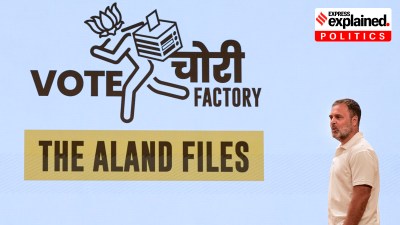Delhi HC reserves order in NewsClick founder Parbir Purkayastha’s plea challenging arrest
Appearing for Prabir Purkayastha, Senior Advocate Kapil Sibal argued that the affidavit filed by Delhi Police in response to his client’s prayers for interim relief contained only the arrest memo.
 Prabir Purkayastha. (Image source: PTI)
Prabir Purkayastha. (Image source: PTI) NewsClick founder and editor-in-chief Prabir Purkayastha told the Delhi High Court Monday that “even till today” the grounds of arrest have not been supplied to him and the same are not found even in the arrest memo. The high court was hearing pleas moved by Purkayastha and NewsClick’s HR head Amit Chakraborty challenging their arrest, remand in a case under the Unlawful Activities (Prevention) Act (UAPA).
A single-judge bench of Justice Tushar Rao Gedela, after hearing the parties for over two hours, reserved orders in the matter. With regard to the challenge to the UAPA FIR, the high court said that when orders are pronounced, it will issue a notice if required.
Appearing for Purkayastha, Senior Advocate Kapil Sibal argued that the affidavit filed by the Delhi Police in response to his client’s prayers for interim relief contained only the arrest memo. He said that the arrest memo only contained reasons which are “different” from the grounds of arrest, adding that the reasons were also general and there were no specific grounds as to the facts and allegations of the case.
He also said that in the remand order, the trial court judge’s signature was next to the time–6 am on October 4–and this shows that the order was signed at 6 am and it was not that the accused were produced at 6 am. He said that this is against Delhi High Court rules which says that the order granting remand must be written and signed at the time it is announced in the presence of the accused.
Chakraborty’s counsel argued that his client is suffering from “59% disability” and he is not a journalist or an editor but only performed certain administrative tasks. He said “throughout the arrest and remand process, I have been clubbed together” with Purkayastha. He further said that there has been no separate application of mind as to his client’s role and the remand application makes no mention of his client’s physical disability.
On the other hand, appearing for the Delhi Police, Solicitor General Tushar Mehta argued that the allegations state that a huge sum comes from a person in China with the purpose of ensuring that the integrity of the country is compromised. He said that he is conscious of the distinction between informing and supplying grounds of arrest as sought by petitioners. “He was informed about the grounds of arrest and this fact is not disputed. He was not supplied and this is also an admitted fact,” Mehta said, adding that as per Section 43B, UAPA does not require supplying but informing of grounds of arrest.
With respect to the Supreme Court’s order last week in the M3M directors Pankaj Bansal and Basant Bansal’s case, Mehta said that although it was pronounced on October 3 it was uploaded on the Supreme Court website on October 4. He added that the investigating agency in that matter was the ED and the Delhi Police was not a party and so were unaware of the Bansal judgment.
Mehta said that “judgment binds us from the day it comes to our knowledge” which was on October 4, while the petitioners were arrested on October 3. He also said that in the Bansal judgment the ED had requested the apex court to make the order prospective and thus the apex court order said that “henceforth a copy of grounds of arrest is furnished to the arrested person as a matter of course…”. He also informed the high court that a review plea is being filed against the Bansal judgment in the Supreme Court.
Sibal countered that “henceforth” would not amount to having a prospective effect as it is a declaration of law where the whole point was that the grounds were not provided in writing. Sibal said that the Bansal judgment was pronounced in open court, and the law applies from October 3 for the whole country. He further said that the review being filed does not change the law and concluded by saying that the provisions of arrest were “pari materia (on same subject/matter)” in the UAPA and PMLA.






